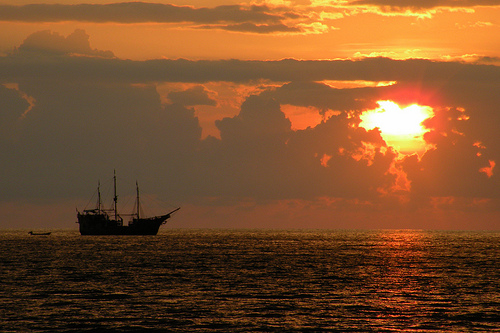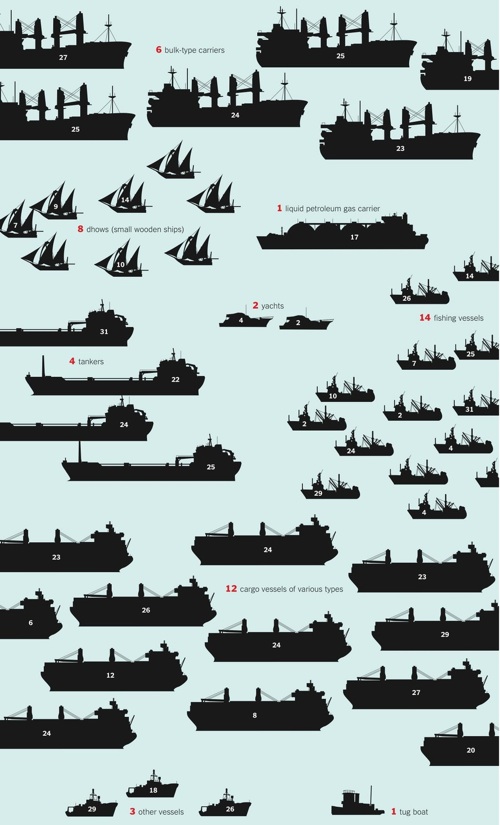Economics is the study of how people choose to allocate scarce resources. Every resource is limited in some way – wood , metal, food, even your time – and economics is the study of how people distribute these resources. Modern economics is broken into microeconomics (study of individuals) and macroeconomics (the study of large-scale economies).
Posts Tagged ‘economics’
Economics is…
Thursday, July 21st, 2011The Economics of Piracy
Friday, March 4th, 2011
(photo credit: paulhami)
Sometimes it’s true: the best way to deal with a bully is to ignore him. But everyone’s got to have a back-up plan, and it looks like the U.S. is getting fed up with the Somali pirate industry.
- Back in 1801, when pirates still wore stockings, Thomas Jefferson decided to end America’s policy of paying off pirates for safe passage through the Mediterranean. The Tripoli-based scoundrels demanded bigger fees, but all they got was a war with the U.S.
- Today may be another turning point; Somalian pirates have been a menace to shipping companies for years, but never before have they been so violent. The recent murder of four vacationing Americans raises the question of just how much the U.S. is willing to take to avoid a major conflict with an ugly enemy.
- The U.S. is hesitant to take military action against the pirates because it’s just too big a job for an army that’s already stretched thin. The ocean is immense, piracy has roots throughout the “failed state” of Somalia, and there is no other viable economy to replace piracy with once it’s eliminated.
Facts & Figures
- The average ransom for a captured ship is $5 million
- The average amount of time hostages spend in captivity is 6 months
- The “red zone” occupied by predatory Somalian ships is bigger than 1 million square miles of ocean
Best Quote
“Of course, I do not know what the U.S. will do in response to this latest atrocity. But Jefferson advocated an armed response and eventually war against Tripoli for far less provocation.” – Frank Lambert, professor at Purdue and an expert on the Barbary pirates
What do you think?
What company could come up with a profitable pirate-control product?
Get to it!
Check out the damage done as of the end of February 2011 in this New York Times infographic. The red numbers show number of vessels currently occupied by Somali pirates, and the white numbers show the number of civilians held hostage on each.
Monetary Policy is…
Wednesday, October 6th, 2010Monetary policy is a plan of action that a Central Bank (like the Federal Reserve) sets in order to keep an economy stable. It’s really important to the overall health of a nation’s finances. The goal is to manage demand by manipulating a company’s money supply and tweaking interest rates.
Central Banks implement monetary policy using a few different methods:
- Open-Market Operations – Directly buying and selling securities in the open market
- Reserve Requirements – Setting regulations that dictate the minimum amount of money a bank must hold in reserve to back up its deposits
- Discount Rate – Changing the rate of interest banks charge other banks to borrow money
Do Rational People Really Exist?
Tuesday, August 18th, 2009If you’ve ever wondered why you gravitate towards expensive things, here’s a possible reason. Obviously, it’s not the whole story (but it sure gives you a good excuse).
- Standard economic theory is based on the assumption that consumers will always act rationally (if it’s more expensive, you’ll buy less, etc.), but psychologists and behavioral economists have been continually proving that this rule is often not followed.
- They argue that just because there is a price increase on a pair of jeans, it doesn’t mean you will now buy fewer pairs – you might actually buy more. Their studies show that people receive more pleasure from items they think are more valuable because they’re expensive (even if they aren’t better quality).
- On the other hand, real-world experimentation has shown that maybe this rational consumer does exist. Some decision making (like choosing which food to eat) is really about basic economics – your preferences aren’t going to change with pricing tricks.
Facts & Figures
- Consumers sometimes react “irrationally” by economics standards – when the price of a good increases, sometimes people want to buy more.
- In an experiment, reward centers of the brain lit up more for a $100 bottle of wine versus a $10 one. It was the same wine.
- In an experiment on food though, people would not want a more expensive entree even if they wouldn’t have to pay for it. They wanted the food they liked – their preferences and rational economic thought won out.
Best Quote
“Maybe, sometimes, old-fashioned economics is just about right. Maybe when it comes to food, people do have reasonably stable preferences. Some people like shrimp and some don’t, even if it’s worth a lot of money.” – Dr. Moses Shayo, Hebrew University of Jerusalem
